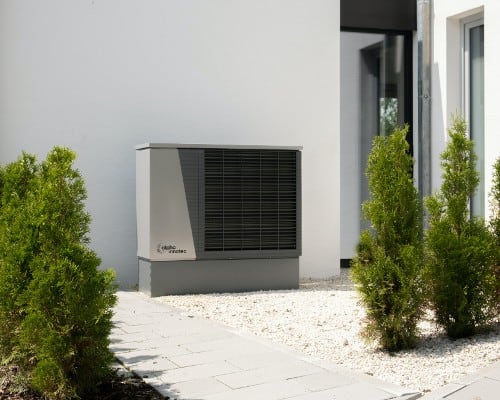As the winter season approaches, we’re sure you’ve been slowly cranking the heat up a few notches. We understand! While we may not get that much snow (if any) here in Arizona, the temperatures do drop.
We’re here to help make the winter and holiday season as cozy and cost-effective as possible. Today, we’re looking at a popular comparison: forced air systems vs heat pumps. Not sure about the difference? Don’t worry – we’ve got you covered.
Read below for all you need to know to choose the best heating system for your home this winter.
What is a forced air system?
A forced air system is a method of heating that involves the distribution of heat through your home’s ductwork. Without getting too jargony, your furnace heats up the air that then gets pushed through your ductwork to each vent in your house.
Like any system, it has its pros and cons:
Pros and cons of forced air units
Pros:
- Efficient Heat Distribution: They ensure equal heat distribution in each room.
- Versatile Cooling Options: You can incorporate an AC or heat pump for cooling capabilities.
- Potential Energy Savings: Energy-efficient systems can help lower your bills.
- Simple Maintenance: Regular tasks like filter changes and inspections maintain system performance.
Cons:
- Maintenance Requirements: These systems need regular check-ups to keep them up and running.
- Environmental Impact: Fuel-burning furnaces can contribute to air pollution. However, you can minimize this with an energy-efficient or electric furnace and regular maintenance.
What’s a heat pump?
Unlike a forced air system that generates heat with a furnace, heat pumps don’t generate heat; they simply transfer warm air and switch it with cold air. In the winter, it draws heat from the air (or ground, if you have a ground-source pump) and brings it into your home. In the summer, it does the exact opposite.
Pros and cons of heat pumps
Pros:
- Efficient Heating and Cooling: They can provide both heating and cooling, eliminating the need for separate systems.
- Lower Energy Costs: Transferring heat consumes less energy, reducing monthly costs.
- Reduced Carbon Footprint: Lower energy consumption makes them more environmentally friendly.
- Compatibility: Works with various heating technologies and home set ups – adaptable to existing infrastructure.
Cons:
- Dependence on External temperature: Efficiency may decrease in colder climates, though modern technology has improved performance in cold weather.
4 Differences between these heating systems
Now that we’ve given you an overview of each system and some of their benefits and drawbacks, here’s a list of the four differences you should know before choosing a heating system.
#1 Heating modes and heat transfer
A forced air system relies primarily on combustion (burning fuel). The furnace burns fuel (typically gas or oil – though there are electric versions, too) to heat up the air that gets pushed through the ductwork and vents.
Heat pumps don’t use fossil fuels – they use electricity to transfer the heat. Depending on the type of heat pump you choose, it will either deliver warm or cool air through your ductwork or multiple air handler units.
If you have ductwork, you can use either system. If you don’t, a heat pump offers more versatility.
#2 Energy efficiency and operating costs
Forced air systems are pretty efficient at what they do. However, their energy usage will be affected by fuel type, the system’s age, and how well it’s been maintained. Newer forced air systems are usually more efficient; however, these can still lose heat in the ductwork.
That’s why it’s wise to make sure your ducts are insulated and sealed to keep the heat in.
Heat pumps are a little more efficient, as It takes less energy to move air than it does to generate heat. Doubling as a cooling system, they can also save you money in the summer.
So, in the dance of energy efficiency and operating costs, both systems have their own rhythm. Depending on your system’s fuel type, efficiency can vary. Operating costs also depend on several factors, including your home’s insulation, your specific heating and cooling needs, and local fuel prices.
#3 Effectiveness in different climate conditions
A combustion-based forced air system can usually hold its own in intense cold. It relies on a direct source of heat, and therefore, the external temperature does not influence its heating efficiency.
On the other hand, despite being champions of efficiency, heat pumps face a tougher challenge in colder climates. As the outside temperature plummets, there’s less heat available for the system to capture and transfer.
In really cold conditions, a heat pump might struggle to keep up, requiring supplementary heating (often in the form of electric resistance heaters), which can be less energy-efficient.
For Arizona homeowners, winters are fairly mild, with temperatures rarely dropping below freezing. In this case, a heat pump would be an excellent choice, efficiently maintaining a comfortable indoor temperature by leveraging the mild external heat.
The bonus? When the hot Arizona summer kicks in, the heat pump can reverse its operation, acting as a cooling system to keep your home pleasantly chill.
If you’re not sure, book an appointment with our team. We’ll take a look at your property and give you a professional recommendation.
#4 Maintenance requirements
Forced air system maintenance typically involves routine inspection and cleaning of the furnace and the ductwork. The air filters need to be replaced regularly, usually every 1-3 months, depending on the filter type and your needs (pet owners should replace filters more often).
Because a heat pump works year-round, pulling double duty by providing both heating and cooling, it may require more frequent maintenance. We’d recommend bi-annual check-ups in the spring and fall, including component adjustments, refrigerant level checks, and regular filter changes.
Regardless of your system, routine professional maintenance ensures optimal performance. We’ll help keep your unit in tip-top shape.
Which is the right system for my home?
With milder winters and hot summers, home and property owners in Arizona might benefit from a heat pump. It can double as a cooling system and is highly efficient at creating a comfy climate in your home.
That said, this doesn’t necessarily mean it’s the perfect fit for everyone.
Consider your home’s specific needs, including its size, your insulation, and your family’s preferences. Also, be sure to contact and consult a pro like the ones at River Valley. We can help guide you to the perfect solution for you.
Get the best HVAC system for your needs
Ultimately, the best system depends on the homeowner. If you need a professional’s opinion, contact the team. We’ll take a look at your home, consider your needs and give you an expert recommendation. Your comfort is our top priority.
Contact us today for a professional consultation and we’ll find the best HVAC solution for your home.

